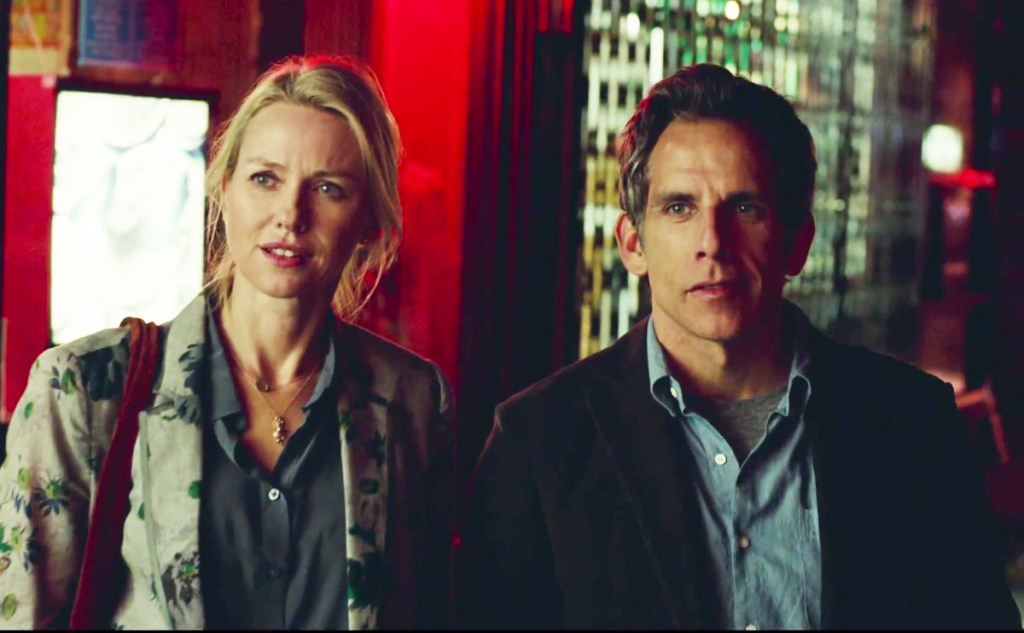
“While We’re Young”: And now we’re all 97 minutes older
On paper, Noah Baumbach’s new movie While We’re Young starts out as a wry comedy about the X/Millennial generation gap, then ultimately becomes a thoughtful meditation on maturity and truth. On screen, the movie starts out as a loose collection of gags about the baby-making years versus the baby-raising years, then ultimately degenerates into a series of tedious epiphanies involving a character we care steadily less about.
That character is Josh (Ben Stiller), a documentarian who’s been working on his latest film for ten years. (A tedious talking-head doc about a gnomic, ancient philosopher, Josh’s film is essentially identical to the one Woody Allen’s character is making in Crimes and Misdemeanors. One nice touch: the philosopher is played by Peter Yarrow of Peter, Paul and Mary.) Josh is married to Cornelia (Naomi Watts), the daughter of his mentor (Charles Grodin). Josh and Cornelia meet aspiring documentarian Jamie (Adam Driver) and his wife Darby (Amanda Seyfried), a young couple whose fun and flirty life is like one of those cell phone ads where everyone is constantly doing exuberant, photogenic things like opening fire hydrants and taking spontaneous singalong road trips in overcrowded cars.
In an exaggerated but welcome reversal of conventional wisdom, as enacted in a tidy, pointed montage it’s the older generation who are tied to their technology, taking iPads to bed and Googling everything in sight while their younger friends play board games in their underwear and luxuriate in blissful ignorance. (“Let’s just…not know,” says Jamie with a beatific glow when Josh reaches for his phone to check a fact.) That’s one of many threads Baumbach could have pursued to an interesting place—particularly since there are indications that Jamie is being disingenuous about his technophobic tendencies—but instead the writer-director is content to throw it out there and let it lie.
As a young Gen-Xer who’s just starting to see my generation represented at the older end of generation-gap movies, I thought While We’re Young would leave me with some food for thought—but no, because these aren’t real people. Neither the 20-somethings who are living a blessed life in an implausibly spacious New York loft nor the older couple’s suddenly baby-obsessed peers feel authentic. The characters occasionally bump into a flash of insight (as when Josh’s friend, played by Beastie Boy Adam Horovitz, admits that even after having a baby, “I’m still the most important person in my life”), but mostly their lifestyles are portrayed with nonsensical gags like Josh’s patently ridiculous hipster hat and the moment when he bizarrely has to mansplain social media to his wife, a successful movie producer who, I thought Baumbach desperately wanted us to see, is always on her phone.
Eventually we come to understand that the inauthenticity of the lifestyles portrayed has to do with the fact that Baumbach isn’t really out to make a movie about culture with a small c: he’s after Culture with a capital C, and wants to probe the question of whether the plastic nature of contemporary media represents a loss of the integrity evinced by people like Grodin’s character, a Wiseman-like social documentarian who gives a big speech about honesty as Josh confronts Jamie with evidence of a deception. While We’re Young could have explored the irony of a member of the MTV generation accusing a younger person of being shallow and flashy, but even that idea is more than this haphazard film has the patience to dig into.
Baumbach continues to ask us to sympathize with Josh even as his character goes from hapless to pathetic, while other characters get kicked to the curb. What does Cornelia see in Josh? We don’t know, because the movie never really deals with their relationship, and it certainly doesn’t give Cornelia’s character any space to breathe—as my girlfriend, who called the movie flat-out offensive, observed, While We’re Young only passes the Bechdel Test because two women have a conversation about babies. The movie’s ostensibly happy ending comes out of nowhere, and its final scene is absolutely the perfect capper to a film that again and again goes for cheap would-be yuks, no matter how inconsistent they are with the film’s internal logic—let alone with actual reality.
In the end, While We’re Young is an enormously frustrating movie because Baumbach gives himself so many opportunities to succeed with this potentially rich material and a strong cast. There’s one poignant moment that Baumbach could have built a better movie around: Josh and Cornelia realize that they haven’t been invited to a party thrown by a pair of their peers, who assumed that the childless Josh and Cornelia would rather hang out with their new, young friends rather than spend time with a bunch of 40-something moms and dads. In a good movie, this would have led to an exploration of who Josh and Cornelia are as individuals, of how they’ve grown apart from their friends, of what it means to build and maintain relationships as people grow and change over the course of their lives.
No such luck. For a moment, after While We’re Young ended, I found myself wondering whether Baumbach was trying to prove his point by actually making the movie that Josh accuses Jamie of making: a film that’s dishonest but flashy, a film that offers big ideas to please the intelligentsia while also being accessible to the yokels, in the end managing to somehow please everyone while actually amounting to nothing of substance at all. Then I realized that there’s a crucial difference: everyone in While We’re Young seems to agree that Jamie’s film is enjoyable to watch.
